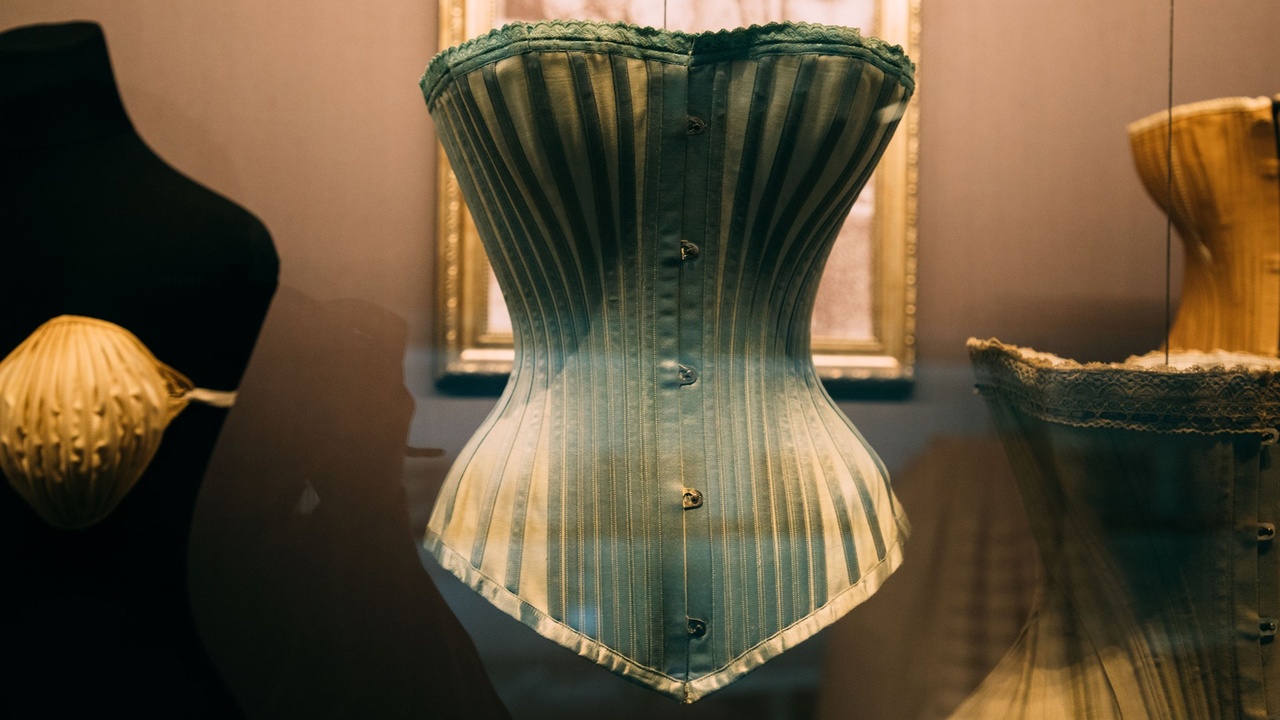How The Invisible Corset Disconnects Women From Their Bodies

The Invisible Corset
The invisible corset is a set of culturally-inherited beliefs that make us as uncomfortable and restricted in our bodies as whalebone corsets once did. While the invisible corset impacts everyone in our modern society, it specifically targets women through the beauty, diet, and cosmetic surgery industries.
The five main “strings” of the corset are fear, domination, disconnection, mechanization, and coercion. As long as we are wearing the corset, we see our bodies as machines to control, instead of wise beings to trust. A machine is not capable of communicating with nature, healing itself, or making intuitive choices. Only a living being can do that.
3 Signs of Body Disconnection
Here are three key ways the invisible corset makes women disconnect from their bodies.
1. We prioritize appearance over experience.
When it comes to makeup, chronic dieting, highly uncomfortable but fashionable clothing, or cosmetic surgery, I often hear women say, “I’m doing it for me, because it makes me feel good.”
A key sign that you’re acting from body disconnection is making choices that make you feel physically uncomfortable, while thinking that you’re doing it “for you.” In reality, these choices stem from body insecurity, not true self-expression. Start to break this pattern by asking yourself, “What physically feels better to me?”
For example, does it feel physically better to be able to rub your eyes because you’re not wearing mascara? Does it feel physically better to not have needles injecting fillers into your lips or forehead? Does it physically feel better to not get your pubic hair ripped out with hot wax? If you weren’t sold the lie, “Beauty is pain,” what uncomfortable beauty practices would you ditch.
2. We force ourselves to fit “body trends.”
Women’s “ideal body shape” goes in and out of fashion, just like clothing. In the 1500’s, women bound their breasts and shaved their eyebrows to create a childlike, nonsexual look. In the 1600’s, voluptuous curves and cellulite enjoyed time in the limelight (look up Peter Paul Rubens art for examples). In the late 1800’s, women achieved an extreme hourglass shape with corsets and bustles.
After decades of idealizing curve-free bodies, this extreme hourglass shape is trending again. Women now achieve this look through obsessive dieting, liposuction, fat injections into the butt and thighs, and uncomfortable compression undergarments.
None of these “body trends” are based on biology (with, perhaps, the exception of the softer bodies of the 1600s), since they aren’t natural to most women’s bodies, and are obtained through artificial and unhealthy means. It is a sign of profound body disconnection to make one’s body fit a temporary societal trend.
3. We expect consistency, not cycles, from our bodies.
Women often believe we should “go back” to our pre-baby bodies, should lose the weight we gained through menopause, or should erase every single wrinkle from our faces. All these should beliefs result from the fallacy that the human body is supposed to act more like a machine than a being, remaining unchanged throughout a day, month, year, or life cycle.
Cycles are laws of nature, whereas unchanging consistency is what one expects from machines. Bodies, especially women’s bodies, aren’t meant to be static due to the major hormonal changes we experience each month, and over the course of a lifetime.
Catch yourself the next time you are “shoulding” your body. Ask yourself, “Am I comparing my body to an unnatural standard of consistency? Or am I allowing my body to experience natural cycles?”
A Revolution of Reconnection
In her TED Talk, Yeonmi Park shares how she escaped the dictatorship of North Korea. She explains that the reason North Koreans haven’t started a revolution against the oppressive regime is partly because they do not know the freedom from which they’ve been cut off.
“If you know you’re isolated, that means you’re not isolated. Not knowing is the true definition of isolation,” she stated. In the same way, because we don’t realize that we’re disconnected from our bodies, we’re truly disconnected.
When you are reconnected to your body, the enchantment of the world seeps in through your skin, filling you up with softness, magic, and reverence. I don't know what the gifts of your body are, or what particular invisibilities they connect you to. The voice of the flowers? The whisper of the mouse or the murmur of the snake? The untapped poem within the rock, the painting that shimmers in the leaves, or the choreography folded into the sunbeam?
What I do know is that it’s time for women to cast off our invisible corsets, so that we can reclaim our ability to communicate with nature.
I can’t wait to see a world where women are reconnected to our bodies, completely free of body insecurities and totally immune to the propaganda of the beauty industry. I can’t wait to see a world where women know their bodies not as machines, but as wise and beloved soulmates.
The Invisible Corset: Break Free of Beauty Culture and Embrace Your Radiant Self is endorsed by leading doctors, body image therapists, and eating disorder specialists. It’s available here and at all major booksellers.
LAUREN GEERTSEN (@Body_Connection_Coach) is a Body Connection Coach and author of The Invisible Corset and creator of EmpoweredSustenance.com, a health website read by over 40 million people.
Want to continue reading?
Enter your details below to read more and receive updates via email.









